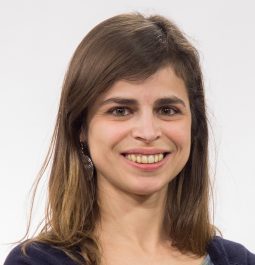Marisa Torres da Silva was born in Lisbon in 1979. She is Full Professor at Faculdade de Ciências Sociais e Humanas, Universidade Nova de Lisboa (NOVA FCSH), where she teaches since 2006, and researcher at ICNOVA (Instituto de Comunicação da NOVA). She is currently Executive Coordinator of the Communication Sciences Department at NOVA FCSH, Editor-in-Chief of Media & Jornalismo journal (indexed in Web of Science, Scopus / Q1 – Cultural Studies), Coordinator of the Publics and Audiences section of the Portuguese Association for Communication (SOPCOM), and Co-Coordinator of the Media and Journalism group (ICNOVA). She was Principal Investigator of the project “Incivility and Online hate speech: online comments in electoral context”, funded by the Portuguese Regulatory Authority for the Media – ERC (2020-2021), Coordinator of the Portuguese team of the international collaborative project “News as Democratic Resources. Cross Cultural Comparative Research” (2013-2018), Co-Coordinator of the national project “The Risks of Extreme-Right Normalisation in Portugal and other European countries” (funded by a investigative journalism grant from Gulbenkian Foundation, gathering professors, professional journalists and undergraduate journalism students), and Local Researcher / Focus Group Leader (Portugal) of “New Neighbours” (funded by the European Commission). She is currently member of international and national funded projects, such as “Media Pluralism Monitor” (funded by the European Commission) and “YouNDigital” (funded by the Portuguese Science and Technology Foundation). She was member of other international and national funded research projects, namely “Social Media Resilience Toolkit – SMaRT-EU” (co-financed by European Commission/LC-01563446), “Online Violence Against Women during COVID-19” and “PINBook PT: Political Interest Networks in Facebook Portugal” (both funded by the Portuguese Science and Technology Foundation), “Fair or Flawed: Experiments on Perceptions of Hate Speech Moderation” (funded by a Content Policy Research on Social Media Platforms research award from Facebook), or “EIJI – Innovative Strategies of Investigative Reporting” (funded by ICNOVA). Marisa Torres da Silva concluded her PhD in Communication Sciences (2010) at the NOVA University of Lisbon (NOVA FCSH) with a thesis on letters to the editor in the Portuguese press. She did a post-doc (2012-2015) at the same university on internet, deliberative democracy and participatory journalism. She was distinguished with the Santander Prize for Internationalisation of Scientific Production at NOVA FCSH (2nd place ex-aequo, 2018). Her research interests include the relationship between journalism, democracy and audiences, online hate speech, news and civic literacy, news consumption and audience research, gender and journalism, investigative journalism, and cultural journalism. She has widely researched and published in these fields of study, including six books, six special issues, 26 articles in peer-reviewed journals (e.g. Journalism Practice, Journalism Studies, Journalism, International Journal of Communication, Communication & Society, New Media & Society, Participations), 21 book chapters, and other publications, as well as over 90 papers presented in national and International conferences. She worked as a freelance journalist (2001-2009) in many Portuguese press publications and is a certified trainer by the Ministry of Education, the Union of Portuguese Journalists and the National Scientific-Pedagogical Council of Continuous Education, which supervises the training of teachers in Portugal.

Departamento de Ciências da Comunicação (DCC)
Professor/a Catedrático/a
Gabinete: B505
marisatorresilva@fcsh.unl.ptUnidade de investigação: Instituto de Comunicação da NOVA (ICNOVA)
Áreas de investigação: Journalism and Media Studies, Public Sphere, Deliberative Democracy, Digital Media, Online deliberation, Cultural journalism, Gender and communication, Audience and Reception Studies, Online Hate Speech
